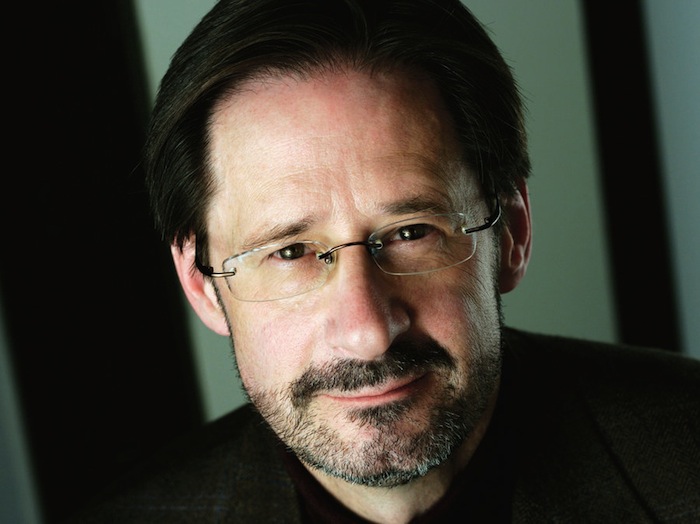BMOP provides committed performances of American works
Steven Stucky’s unexpected death from a brain tumor this past February left a void in American music. The composer’s works live on and garnered him widespread attention in his lifetime, culminating in the Pulitzer Prize for his Second Concerto for Orchestra in 2005. Pieces such as that are supremely crafted, tinged with dissonances yet imbued with an underlying lyricism that leave listeners wanting more. He was, as the Boston Modern Orchestra Project’s seasoning opening program indicated, an American master.
BMOP, led by Gil Rose, offered works by Stucky and three other Americans as an homage to the late composer Saturday night at Jordan Hall.
Boston new music ensembles have frequently performed Stucky’s music. Two seasons ago BMOP presented memorable readings of his American Muse and First Concerto for Orchestra, works that deserve many repeated hearings. Saturday night featured Stucky’s Chamber Concerto, a piece every bit as riveting as his more popular essays for orchestra.
Stucky is a master of orchestral color and his Chamber Concerto is a case in point. Completed in 2009, the work makes dexterous use of wind and brass figures, and like his Concertos for Orchestra, delicately weaves lines from a small grouping of instruments into those of the larger ensemble.
As in his Symphony of 2012, the Chamber Concerto opens with a wash of shimmering colors that unfold in luminous sheets of sound. The themes and orchestral lines are seamlessly woven together: the strum of a harp and sustained notes in the violins evolve organically into a clarinet solo. Elsewhere the fifteen-minute work has episodes of Wagnerian depth, achieved through the rich colors of the BMOP double basses and French horns.
Rose led the orchestra in an engaging journey from light to darkness, with the ensemble supplying Stucky’s music with plush warmth when called upon.
Saturday’s program also featured a true rarity, Gail Kubik’s Symphony Concertante of 1952.
Though largely forgotten today, Kubik led a brief though high-profile career as a composer of film scores, with Humphrey Bogart’s picture The Desperate Hours, the propaganda film Memphis Belle, and Gerald McBoing-Boing, which won the 1950 Academy Award for Best Animated Short, standing as the most popular examples. His concert works made frequent use of the singsong style as well as the brash sounds of 1940s and 50s era film music.
Jazz also plays a role. His Symphony Concertante, which pits an unusual trio of trumpet, viola, and piano against the orchestra, includes stride-like riffs and bluesy passages that connect the disjointed, Stravinskian elements of the first movement. The third movement abounds in nervous energy in the manner of Poulenc and Honegger, while the second movement supplies the work’s caramel center. There the trumpet sounds a languid melody that is offset by wide leaps. Viola complements the trumpet’s line while the piano adds dark, searching harmony.
Bringing this piece to vivid life was a trio of fine soloists. Pianist Vivian Choi played with precision and firm feel for Kubik’s funky rhythms. Violist Jing Peng performed her lines with amber-rich tone, and trumpeter Terry Everson handled the wide-leaping melodies with clarity and a golden, singing sound. The second movement, a gorgeous piece of mid-century American modernism, featured Everson and Peng in a warm, searching duet. Rose led an orchestral accompaniment cast in bold colors.
The concert opened with Michael Colgrass’ The Schubert Birds (1989). Based on Schubert’s little-known Kupelwieser Waltz, Colgrass’ score is an imagining of a musical conversation between Schubert and Charlie Parker. As one can guess, lyricism abounds.
But that lyricism grinds against angular figures and chirping bird sounds, which makes for intriguing and unusual listening. The waltz theme itself forms out of the mists before dissolving into clouds of dissonances. It returns at the end in its original form to supply the music with an atmosphere of nostalgia.
As in the Kubik work, jazz licks permeate the central sections of The Schubert Birds, with a bluesy duet between oboe and contrabassoon and rapid-fire trumpet lines that stretch into the upper register among the highlights. The BMOP musicians sounded splendid as Rose led them in a reading of bracing intensity.
The music of Harold Shapero has fallen into undeserved neglect. Luckily, Gil Rose and BMOP have heaped some attention on the Boston composer’s music through performances in recent seasons. Saturday night the orchestra offered Shapero’s Partita in C.
Completed in 1960, this work for piano and orchestra is modeled on the Baroque suite. Shapero, a major proponent of American neoclassicism, makes dexterous use of Baroque idioms. Partita in C opens as a French overture does, with the music’s dotted rhythms punching out a melody imbued with Stravinskian twists. The piano part, played with power and commitment by Vivian Choi, has the streams and eddies associated with Bach’s music along with the powerful left-hand sonorities of Rachmaninoff.
The “in C” marking of the piece is a bit of a misnomer as Shapero’s score is widely chromatic, even making use of the twelve-tone technique so that the harmonies build to bristly clusters. But there are moments of tender, white-note lyricism. The Aria central to the eight-movement piece features a svelte duet between English horn and harp. Rose and BMOP, through playing of clarity and precision, made a strong case for Shapero’s score.
In an interview with Elliott Carter, Steven Stucky claimed that the reason new music isn’t well received is because it isn’t performed well. The same can be said for pieces such as the ones mentioned above, which have fallen into the cracks of history. But with BMOP’s committed performances Saturday night, new and forgotten repertoire is finally receiving the attention is deserves.
Gil Rose will lead the Boston Modern Orchestra Project and Odyssey Opera in Lowell Liebermann’s The Picture of Dorian Gray 8 p.m. November 18 at Jordan Hall. bmop.org
Posted in Performances




